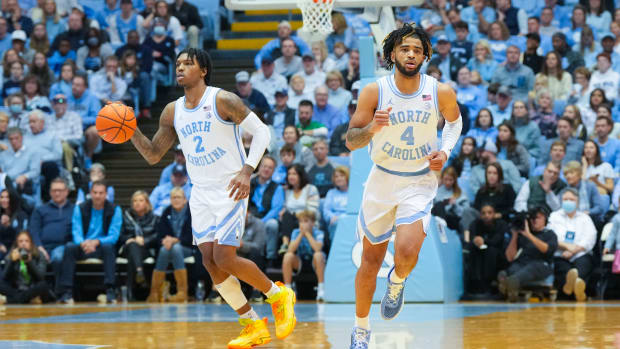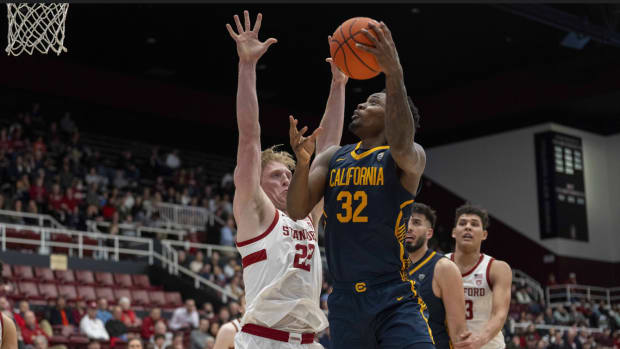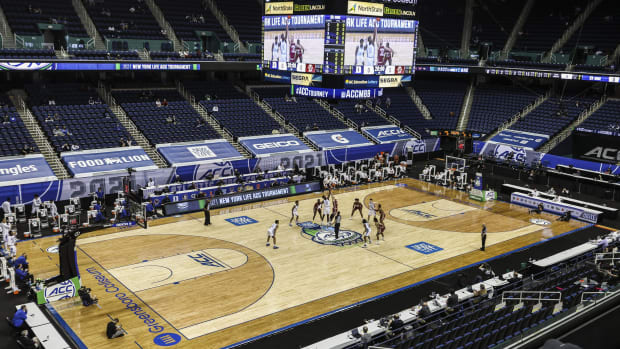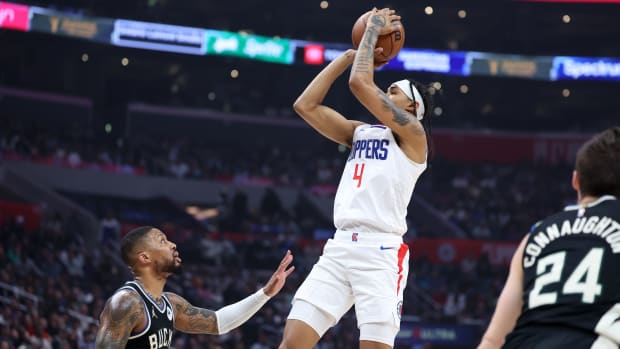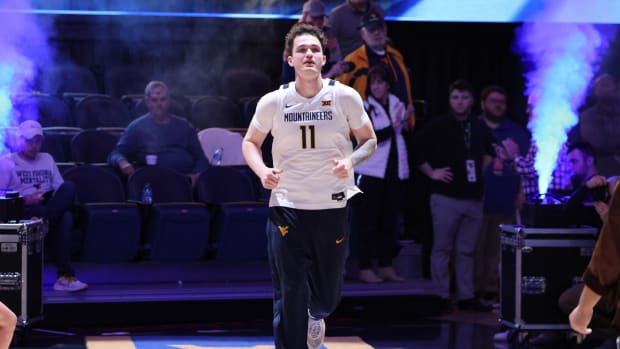In uncertain times, Louisville-Michigan NCAA title game shines
ATLANTA -- The NCAA tournament is just 20 days long, from First Four to national championship game, a blur of competition that's been justly accused of overwhelming the four-month regular season that precedes and enables it. The seeding is more suspect by the year and its domed-stadium final venues often suck the energy from the matchups, as if they wish they were football games on 94 feet of wood. The student-athlete model is hopelessly broken and under withering fire. Yet the tournament itself is a remarkably efficient sorting machine, casting out the weak and killing storylines mid-script in search of a validating moment on the second Monday night in April. It is less than three weeks of real-time basketball, yet when it is finished, it leaves few questions unanswered and few riddles unsolved. By the sixth game, we have a matchup -- and then a champion -- that usually feels just about right.
A year ago in New Orleans, there was little doubt that coach John Calipari's Kentucky franchise was deserving of a national title and America would have to make its peace with seeing a net finally draped from Coach Cal's neck (which had so often escaped the guillotine of corporal NCAA punishment). There was a larger message in the moment, that it was possible to win with a core of players less than a year removed from high school graduation (albeit with considerable help from their elders); and the moment itself was unambiguous. Kentucky was the best and most deserving team. The year before that Connecticut seemed a wildly unlikely winner in mid-March yet clearly the best in April. The message was that a great and charismatic senior player like Kemba Walker can carry a team and the moment, too, was crystal clear. The tournament is ruthless; six games are plenty to decide who is best. Six games filter away the unqualified.
So it is that Louisville and Michigan meet Monday night on the floor of the Georgia Dome. Regular season powerhouses like Indiana, Georgetown and Kansas have been sent home to watch and begin the long climb back to March. Florida Gulf Coast University, the improbable darlings of the first weekend, have been gone so long that their coach is already the coach somewhere else. Wichita State, the last unlikely heroes remaining in the field, played into the final seconds of Saturday night's first semifinal before finally caving under Louisville's pressure defense, the collective emotional energy of Kevin Ware's presence and, in perpetuity for Shockers' fans, a controversial call in the final seconds. Syracuse's unlikely run ended at the hands of a crewcut, high-post Magic man and with a terrible last possession. Leaving only two teams to play on.
Louisville is coached by a newly-minted Hall of Famer, Rick Pitino, gilding his legacy, yet at the same time emerging from an unseemly and embarrassing decade-old scandal that will never leave him but recedes deeper into his personal biography. He won the NCAA title with Kentucky in 1996 and can become the first college basketball coach in history to win national championships at two different colleges. (Neither Wooden, Knight nor Krzyzewski did it; though insofar as we know, none of them engaged in coitus on a restaurant floor and Pitino will always live with that fact becoming public).
DAVIS: Four reasons why Michigan will win the national title
Michigan is coached by an inveterate lifer, John Beilein, who is just five months younger than Pitino (both men are 60) and has coached at every level of basketball -- high school, junior college, Division III, II and literally every possible level of Division I (Canisius, Richmond, West Virginia and now Michigan). He is a classic character in college basketball's tableau, the great, undiscovered coach, finally given his due on the biggest stage.
Louisville was here (here being the Final Four) a year ago and drew the unfortunate task of playing a civil war semifinal against Kentucky that exposed the Cardinals as lesser little brothers to the mighty Wildcats. But they are back with a team that is the antithesis of the hurried philosophy that has overtaken college basketball in the so-called one-and-done era. Their leaders are guards Russ Smith, a junior, and Peyton Siva, a senior. When they needed rescuing in the semifinals, it was a junior, Luke Hancock, who scored 20 points; and, of all things, a walk-on junior, Tim Henderson, who bottomed a pair of three-point baskets when it appeared that the Cardinals might simply fall too far behind to catch Wichita State. Nary a freshman moves the Cardinals; they are old and experienced, unmoved by getting close, appreciative of the climb.
They were the best team at the end of the season, the one picked by the most bracket aficionados to stand alone at the end. Louisville hasn't lost since a 105-101 five-overtime loss to Notre Dame in South Bend on Feb. 9. That was 58 days ago, nearly half a regular season, a winning streak of 15 games.
And too, they are famously motivated by the presence of Ware, whose horrific broken leg swallowed every other Final Four storyline whole. A cynical media began to grow weary of Ware as the semifinals approached; after all, once the video was logged, he had suffered just an orthopedic injury, albeit one that was gruesome in appearance. Yet if Ware's story seems overblown by those who carry cameras and type on laptops, its importance to his teammates is real. It is easy to dismiss inspiration as melodrama from the outside, easy to disregard its genuine power.
Michigan comes to the championship full of clueless joy. Four of the team's key rotation players are freshmen and three of them -- center Mitch McGary, forward Glenn Robinson III and guard Spike Albrecht -- played on the same northwest Indiana AAU team. They know nothing (in a good way) and fear nothing. It's a measure of the Wolverines' locker room vibe that after their grinding, 61-56 win over Syracuse in Saturday night's second game, point guard and Big Ten player of the year Trey Burke was asked repeatedly if this success validated his decision to "come back'' to Michigan instead of leaving for the NBA. Burke, it should be noted, is a sophomore. His matchup with Louisville's Smith, pairing two of the most dynamic guards in the country, will be a vital and thrilling subplot to the title game.
Yet for Michigan, success or failure could lay across the broad shoulders of the sensational -- and sensationally goofy -- 6-foot-10 McGary, who started just two regular season games and has emerged in the postseason as a difference-making force for the Wolverines. Unlike Louisville, Michigan did not come into the tournament hot. They had contended all season for the Big Ten championship, widely regarded as the strongest conference in the country, yet on the final day of the season they had lost at home by a point to Indiana, ceding the undisputed title to the Hoosiers. They were bounced from the Big Ten tournament in the semifinals by Wisconsin and entered the Big Dance with three losses in six games, including a hideous loss at Big Ten doormat Penn State.
But McGary has elevated them. In addition to breakout regional performances against Kansas and Florida, he was sensational against Syracuse with 10 points, 12 rebounds and six assists (a third of his season's total entering the game). Included in his dimes were a three-on-one fast break dish to Tim Hardaway, Jr. and two lookaway passes from the high post, carving up the Syracuse 2-3 zone. His story captivates -- he once delivered newspapers on a unicycle and stopped eating junk food in January, dropping 20 pounds and becoming more effective -- but his game is even better.
Michigan has no Kevin Ware, but they, too, are riding an emotional wave. They should truly not be here. Had Kansas not blown a 14-point lead in the final six minutes of their Sweet 16 matchup, and had Jayhawks point guard Elijah Johnson not missed the front end of a one-and-one, then Burke would never have been given the chance to make a three-pointer from the clouds to force overtime. These are the whims of survival and the unfeeling coda of the tournament.
These are uncertain times for college sport. The NCAA is facing down ever more strident criticism of its (hypocritical?) student-athlete model, both in the media and in the courts. There is the unmistakable scent of change in the air. Something is badly broken and might soon be painfully fixed. So tonight, as always, is once more for suspending disbelief and embracing the end of the ride in one, last game. It is a game worthy of that honor. A game that feels right.
